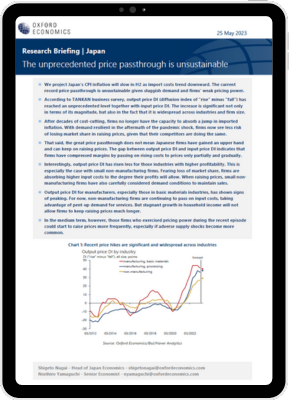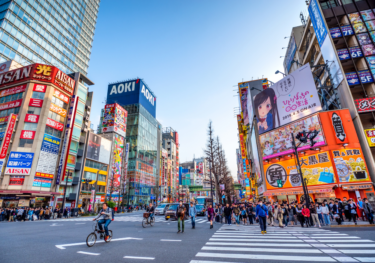The unprecedented price passthrough is unsustainable in Japan

We project Japan’s CPI inflation will slow in H2 as import costs trend downward. The current record price passthrough is unsustainable given sluggish demand and firms’ weak pricing power.
What you will learn:
- After decades of cost-cutting, firms no longer have the capacity to absorb a jump in imported inflation. With demand resilient in the aftermath of the pandemic shock, firms now see less risk of losing market share in raising prices, given that their competitors are doing the same.
- That said, the great price passthrough does not mean Japanese firms have gained an upper hand and can keep on raising prices. The gap between output price DI and input price DI indicates that firms have compressed margins by passing on rising costs to prices only partially and gradually.
- Output price DI for manufacturers, especially those in basic materials industries, has shown signs of peaking. For now, non-manufacturing firms are continuing to pass on input costs, taking advantage of pent-up demand for services. But stagnant growth in household income will not allow firms to keep raising prices much longer.
Tags:
Related posts

Post
How Asia’s supply chains are changing | Techonomics Talks
Global supply chains have continued to expand, despite talk of deglobalization and nearshoring. US and Japan have started to de-couple from China, but other G7 countries grow more dependent on Chinese inputs. Several "hotspots" are emerging across Asia with multiple winning formulas.
Find Out More
Post
BoJ to raise its policy rate cautiously to 1% by 2028
We now project that the Bank of Japan will start to raise its policy rate next spring assuming another robust wage settlement at the Spring Negotiation. If inflation remains on a path towards 2%, the BoJ will likely raise rates cautiously to a terminal rate of around 1% in 2028.
Find Out More
Post
Japan inflation to rise to 1.8%, but downside risks are high
Reflecting a surprisingly strong Spring Negotiation result and weaker yen assumption, we have upgraded our baseline wage and inflation forecasts. We now project higher wage settlements will push inflation towards 1.8% by 2027. Uncertainty is high, however.
Find Out More